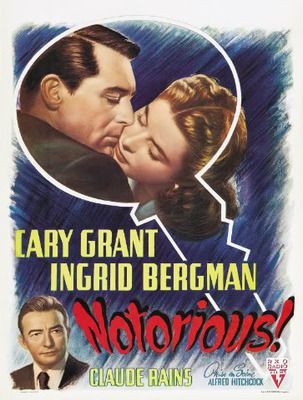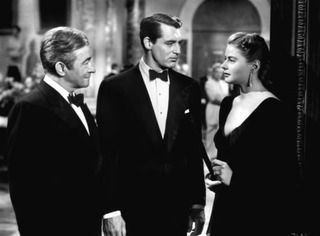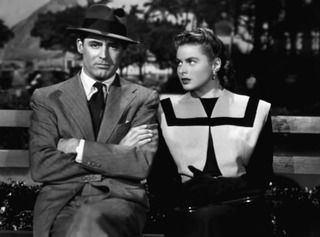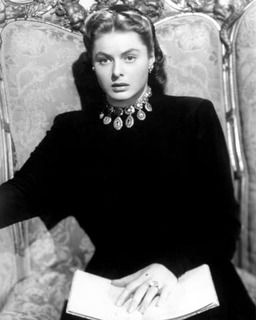
Notorious
1946
Director: Alfred Hitchcock
Starring: Ingrid Bergman, Cary Grant, Claude Rains
Made in between his early, admired British films (The 39 Steps, The Lodger) and his creative peak in Hollywood in the fifties and early sixties (Rear Window, Vertigo, Psycho, North by Northwest), Notorious is unlike other Hitchcock films. Yes, the suspense element makes it classic Hitchcock, but the relationship at the core of the film is such a damaged, dirty, unhealthy one, it is Hitchcock’s most clearly realized interpretation of film noir as well.
Alicia Huberman's (Bergman) father is jailed for treason for working with the Nazis after the end of WWII. She is pressed into servitude for the US government by an agent named Devlin (Grant) to atone for her father's actions. The agency takes her to Rio to spy on some old friends of her father's. One of her pop's old friends, Alex Sebastian, (Rains) takes quite an interest in her, which causes no end of grief for Devlin, who has also fallen in love with Alicia.
The spy story, involving Nazis and some uranium, is an afterthought when compared to the central focus of the movie: the relationship between Alicia and Devlin. These two people and how they interact is the driving focus of the film and the main attraction. The relationship, such as it is, between Alicia and Devlin is what sets this film apart. These are not very nice people. From the beginning of the film, they hurl insults at one another, venom and bitterness dripping from every word. They finally realize they, well, like one another ("love" might be a bit too strong), they are happy for the briefest of moments, but then everything goes wrong when Alicia's new job as spy has her marrying Sebastian. Devlin behaves like a petty schoolboy, angry and jealous, emotionally stunted, and lashing out at the one person who seems to mean most to him. He's forced to whore out his girlfriend, and he reacts terribly badly. Well, who wouldn't, but he cannot rise above it, even when she is begging him to cut her some slack.

The central relationship between Alicia and Devlin, the driving force of the movie, is shocking in its blatant sado-masochism, especially considering that it was made in 1946. Each party seems constantly trying to deliberately cause pain and tear the other down; and yet, there is an attraction between them that somehow manages to keep their bond from being permanently severed. Theirs is a relationship filled with hate and confrontation that starts at their very first meeting. When we first see the back of Devlin’s head at the beginning of the film, he is still, but Alicia notices him and starts taunting him for his silence. Later in the scene, after they have started their flirtation, a drunk Alicia insists on taking a midnight drive while Devlin objects; very early on in their association, they are battling for control. Devlin wants to drive, but the only way he can get his wish ultimately is to physically hurt Alicia; he punches her out so he can drive home. He can only exert control through causing physical pain. Later on, at pivotal points in their relationship, he will repeat this behavior. At their first kiss, he brutally initiates it, more, it seems, as a way to stop Alicia’s taunting and to again exert his control. When meeting Sebastian for the first time, Devlin kicks Alicia’s horse. Devlin is clearly a character who likes to control a situation by means of physical force.
Hitchcock draws attention to the divisive relationship between Devlin and Alicia by using the same camera shot pattern throughout much of their relationship. In many of their key scenes, when the two are spewing venom and hate and taunts at one another, we see the start of the battle as a twoshot with both combatants in frame. It is a symbolic introduction to the fight: both warriors face one another and bow. Next is a shot-reverse shot pattern for the majority of the rest of the exchange. Hitchcock goes from a oneshot of one part of his couple to a oneshot of the other, and back and forth. This intercutting between Alicia and Devlin as they either tell one another they hate one another or emotionally withhold their true feelings turns the verbal sparring into a visual fencing match. Attack, riposte, lunge. In the famous scene with the long kiss, when Alicia and Devlin are playing at being in love, the break from this pattern is notable for the fact that both lovers are in the same frame as one another for a long time. Similarly, at the end of the film, when the lovers are finally united, there is no more verbal sparring, and this pattern is gone.

Given that Hitchcock invests the vast majority of the film convincing us of the twisted nature of the relationship between Alicia and Devlin, he surprises in the last twenty minutes by giving this couple, of all things, a fairy tale twist. Once Alex has determined that Alicia is spying on him, he and his all-seeing overlord of a mother decided that Alicia must be “taken care of” by slipping something toxic into her coffee. At this point, the Sebastian mansion becomes a castle where Alicia, the beautiful princess, is being held captive in the highest turret, or the second floor bedroom. The evil stepmother queen is behind it all, and the evil prince helps carry out the dastardly plan. Hitchcock first plays up this theme when Alicia realizes what is happening to her; in this scene, both she and Alex are seated in the most ludicrously extravagant chairs, or, rather, thrones. Alicia is wearing overstated jewelry, fitting of royalty. Once she makes her horrible realization, she is forcibly escorted up the long, winding staircase, to be imprisoned in the highest room in the tallest turret. Her only means of communication with the outside world is some sort of mystical connection with Devlin; Hitchcock intercuts between Alicia, ailing, in bed, and Devlin, as if to say that she is crying out his name telepathically. Devlin is preternaturally summoned to the Sebastian Castle and must brave the evils that lie therein (the wicked stepmother and the Nazi monsters) in order to free the princess from their vicious clutches. A magical connection between a couple, born of deepest love, is a fairytale and romance novel convention that has been used for centuries; the fact that it is used in reference to two people who have been punishing one another for over an hour is ambiguous at best. Are we supposed to somehow believe that these two have now, suddenly, abandoned their belittling in favor of true love? Hitchcock is certainly doing his best to make an argument for the fortitude of their love, painting it in such an idealized manner; he underlines this bond by constantly having the two lovers in the same frame once Devlin finds and then rescues Alicia. Perhaps it is meant to be a comment on Devlin’s character; he is capable of being the prince that Alicia wanted him to be – he does not say “I love you” until the final scene in the Sebastian Castle – but it took her being poisoned and locked away for him to man up enough to his fate, to finally break down his emotional walls.

Cary Grant, as Devlin, turns in one of his finest acting turns in this film. Grant, for the most part, built his career playing variations of himself - the debonair sophisticate in wacky scenarios. But here, Grant is not just a smooth talking charmer. Devlin is spiteful and bitter and hard and petty. He's possibly the most immature character Grant ever played, and also the most threatening, both emotionally and physically. Hitchcock, who loved to work with Grant, saw a dark side to the genial actor and exploited it in his films, arguably in no film more so than Notorious. It's ironic that Devlin, this unlikeable, bullying person, is the hero of our film.
If spiteful, insult-hurling Devlin is our hero, who is our villain? Ah, that would be mild-mannered mamma's boy Alexander Sebastian, played by Claude Rains - one of Hitchcock's first major mother-loving characters. Sebastian is kind and sincere and rather hopelessly in love with Alicia. He is willing to stand up to his overbearing taskmaster of a mother in order to be with Alicia, and tells Alicia he loves her openly and honestly. This is not to say he is without fault; he has a dangerous propensity to be jealous of his wife, a flaw that ultimately causes his own downfall. Of course, he's also conspiring with the Nazis to bring their regime back, so the laws of movie villainy say he must be brought down, but as far as personality traits go, he's far less traditional villain than hero.
Nothing is clear-cut in Notorious. Right and wrong are relative terms, fitting Notorious nicely within film noir canon. Perhaps this is why this is my favorite Hitchcock film - it combines his trademark suspense with the moral quagmires that litter the film noir landscape, a heady combination indeed.
When everything is said and done, I love this movie. I love it for its emotional complexity, for its devastating central characters, and for the brilliant and psychologically fascinating camerawork. This is not just my favorite Hitchcock film; it is also, flat out, one of my favorite films - ever. I never tire of watching it, and I've seen it at least twenty times.
Arbitrary Rating: 10/10
Well, I have only seen Notorious this once, so maybe I have not gotten as deep into it. What you point out as the best part of the movie I thought was an irritating element. I thought that Devlin being a federal agent is just about as unproffesional as I have ever seen a movie agent be. He is not only getting emotionally involved, he is also endagering his charge for petty reasons. Alicia is pestering him yes in the begining, because she is this wild girl and he is the representative of order that is putting restraints on her. She yields to him, but as soon as they get to Rio he withdraws from he and her pestering seems rather like an attempt to provoke him, to pull him back. She has no idea what happened to him and he is practically selling her out. Is he trying to put up a proffesional attitude finally? Maybe, but then it is totally unproffesional, childish, even criminal that he get jealous on the very job he sets her up on and leave her hanging there. I felt like kicking his teeth. Maybe that is the attraction of the film, but for me it was a major annoyance.
ReplyDeleteI totally see the fairy tale reference with the tower room and the evil king and queen and Devlin the prince who comes to the rescue. To me it just felt awkward that Devlin was able to just walk in, sit on the bedside for 5 - 10 minutes doing a bit of smootching with no interuption (this is a situation of get in, get the girl and get the hell out of there, we can talk later) and then just walk out with a bit of blackmailing he had no way knowing before reaching Alicia.
I see Devlin as more of a problem than a solution and that he also is working on strangling Alicia in his own way. She really takes a dip from wild and flamboyant to meek and submissive.
When all that is said I agree that the triangle of Alicia, Alexander and Devlin was very interesting and Claude Rains is awesome.